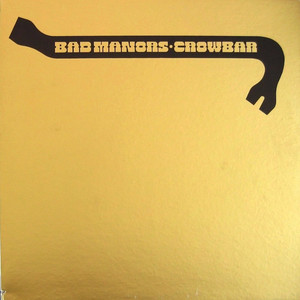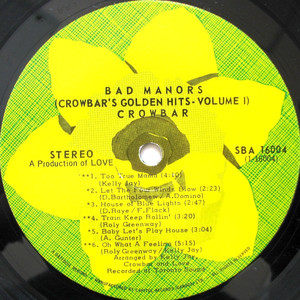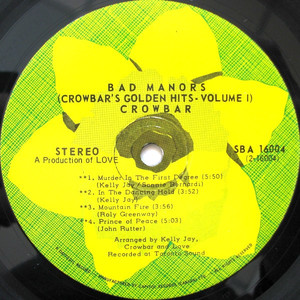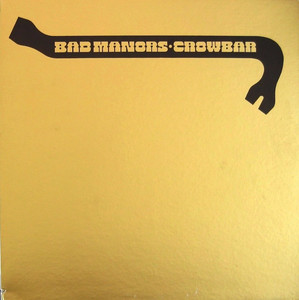Information/Write-up
While in a local Toronto band called The Ascots, Roly Greenway and Rheal Lanthier decided a change was in order, so they packed up their bags and moved to Vegas, where they performed the local clubs for the next couple of years, opening for the likes of Zsa Zsa Gabor and even Liberace. After growing tired of the scene, the group split up, returning to Canada and going their seperate ways. Greenway then hooked up with Bobby Curtola's touring band. By '69 he'd looked up Lanthier and they decided to reform the band, calling themselves this time The Royal Ascot Review. Also in the group was Kelly Jay, whose real name is Blake Fordham, and ex-Ronnie Hawkins' harmonica player, King Biscuit Boy (Richard Newell). But when Hawkins approached Newell to put together his new back-up band, The New Ascots became Ronnie Hawkins and Many Others, which also included guitarist John Gibbard, Richard Bell on keyboards, and Larry Atamaniuk on drums.
With Hawkins the band toured for the next year, appearing on bills with the likes of Mountain, Johnny Winter and Joe Cocker. But in the summer of 1970 amid a drunken ruckus in Hamilton, Hawkins fired the band, and consequently gave the band the idea for the name while screaming profanities at them. Before long the band was doing club dates in and around the Toronto area. Sonnie Bernardi had replaced Atamaniuk on drums and Jozef Chirowski was the new keyboards player after Bell had left. Under the guise of King Biscuit Boy and Crowbar, they released their first album in 1970 called simply OFFICIALLY MUSIC, the first cut on the newly formed Canadian label, Daffodil Records. Newell's blues roots were predominant on the record, and the only single released, "Corrina Corrina".
Musical differences severed ties between Newell and the band the next year however, and Crowbar set sail to England to prepare for the next album. Recorded in Mike Oldfield's English castle, BAD MANORS was released in the spring of '71. The first single epitomized the care-free hippie generation of the day, and "Oh What A Feeling" soared up the charts. This was the first single released after government regulations requiring Canadian radio stations to play one-third homegrown material had come into effect. The single quickly reached gold here, but due to the drug annotations in the song, it didn't receive airplay in the US. Other noteable songs included the 'b' side "Murder In The First Degree", the cover of The Yardbirds' "Train Kept a Rollin'" and the other singles "Happy People" and "Too True Mama".
The band toured extensively in Canada and made their US debut at LA's Whiskey A Go Go the next year. Management quickly decided to cash-in on the band's popularity with a live album. Recorded at Massey Hall in that spring, LARGER THAN LIFE was the quintessential bar band caught live. It showcased the band's blues roots and love for early rock and roll, evident in "Shake Rattle & Roll", "Rock Around The Clock", "Corrina Corrina" and "Tits Up On The Pavement", a new tune about one woman's life on the streets. A mere three weeks after it's release, the album was certified gold. Though "Oh What A Feeling" was also on the album, it failed to chart in the US again because of its lyrical content. Not surpirsingly, the more liberal European audiences ate it up, going gold in England.
HEAVY DUTY, recorded in Toronto, was released in late '72 amid much angst among the loyal following the band had already established. Two singles were released "Hey Baby" and "Dreams", though neither achieved the success expected. Also on the album was "The Eagle And The Beaver", a politically incorrect song about our relationship with our southern neighbours, and "Dead Head From St John's", a track more typical of the crowd buying the albums.
One of the oddest arrangements in Canadian music occurred the next year. Pierre Trudeau was running for re-election as Prime Minister. His wife was a known Crowbar fan, and she asked the band to tour the country with Lucky Pete on the campaign trail. The bid to gain the youth vote worked, except in Alberta. Trudeau was re-elected, Crowbar got some additional exposure, and Margaret moved on to The Rolling Stones. The over-whelming success of the band meant having to hire outside people to handle their affairs. Unfortunately, this meant MISmanagement of their funds.
The band went back into the studios in '73, and released a self-titled album later that fall. Though eagerly scooped up by devoted fans, none of the tracks made a dent in the charts. Lowlights included "Rocky Mountain Tragedy", "Kilroy" and "Million Dollar Weekend". Added to the members' individually taking to the rock and roll lifestyle, this spelled disaster for the band and they disbanded in '74. Quick to try to make a last buck from the band, Daffodil released THE BEST OF CROWBAR that same year.
The members drifted off to do outside projects and after buying the rights to the music, Epic Records released another 'best of' package, MILLION DOLLAR WEEKEND, inspiring the band to get back together in the summer of '77. After a few brief tours over the next couple of years, the band parted ways again. The resurgance of classic rock spawned the release of 2 'best of' packages in 92, MEMORIES ARE MADE OF THIS and BAD MANORS - GREATEST HITS.
Though their run was relatively short, Crowbar emerged on the scene at a time when Canadian music was still searching for an identity. The first to benefit from Canadian Content Regulations, "Oh What A Feeling" summed up the attiude of the times, remaining a true classic today. Their early use of slide guitars and harmonicas were ground-breaking - the music itself raw, yet still refined. They reunited again in the mid 90's to play the 'classic rock weekend' outdoor festivals, and have found their music has indeed stood the test of time.
The band included:
King Biscuit Boy (Richard Newell) on harmonica[1]
Roly Greenway on bass guitar
Kelly Jay (Blake Fordham) on vocals and piano
Jozef Chirowski on keyboards
Sonnie Bernardi on drums
Rheal Lanthier on guitar
John Gibbard on guitar and slide guitar
From 1969 to 1970, most of the members of the group had been a backup band for Ronnie Hawkins. However, he fired them, saying "You guys are so crazy that you could fuck up a crowbar in three seconds!" They recorded their first album in 1970 as King Biscuit Boy and Crowbar. King Biscuit Boy left the band later in 1970, but continued to appear as a guest performer.
The band split up in 1974 but reformed in 1977, except for Chirowski, who had joined Alice Cooper's band in the meantime.
Crowbar. Rock band, formed in the summer of 1969 as And Many Others to accompany Ronnie Hawkins. Taking the name Crowbar, and making its base in Ancaster, near Hamilton, Ont, it left Hawkins early in 1970 after one LP and several US appearances, then backed individual members Blake 'Kelly Jay' Fordham, John Rutter and King Biscuit Boy on record. King Biscuit Boy's album Official Music and single 'Corrina, Corrina' were the most successful releases.
Personnel changes left Crowbar in 1971 with 'Kelly Jay' (vocals, keyboards, harmonica), Rheal Lanthier (lead guitar), John Gibbard (slide guitar), Josef Chirowski (replacing Richard Bell, keyboards), Roly Greenaway (bass guitar) and Sonnie Bernardi (replacing Larry Atamuniuk, drums). King Biscuit Boy continued as a frequent guest performer through 1971.
The most popular of Crowbar's singles were 'Oh What a Feeling' (1971) and 'Million Dollar Weekend' (1974). The band made three LPs 1970-2 for Daffodil - Bad Manors (SBA-16004), Larger than Life (And Liver than You'll Ever Be) (2-SBA-16007, recorded in concert at Massey Hall) and Heavy Duty (SBA-16013) - and one in 1973 for Epic, KE32746 (KE-32746). The compilation Crowbar Classics: Memories Are Made of This (SBA-16030) followed.
Crowbar's rousing rock, blues and boogie made it one of Canada's most popular touring bands of the early 1970s. It appeared in Great Britain but otherwise made little impact outside of Canada, perhaps the result of the strong nationalistic fervour that characterized its performances. Disbanded in 1975, it was revived in 1977 for a tour of eastern Canada and again by Kelly Jay and others intermittently during the 1980s for club work in southern Ontario.
Larry Atamniuk (drums)
King Biscuit Boy [aka Richard Newell] (harmonica)
Roly Greenway (bass)
Kelly Jay [aka Blake Fordham] (vocals, piano)
Rheal Lanthier (guitar)
Richard Bell (keyboards)
John Gibbard (slide guitar)
Sonnie Bernardi (drums; replaced Atamniuk 1970)
Jozef Chirowski (keyboards; replaced Bell 1970)
Ray Harrison (keyboards; replaced Chirowski 1977)
Rick Birkett (bass; replaced Greenway 1977)
Crowbar's roots can be traced back almost as far back as Roly Greenway's career. Greenway first played guitar in The Centurys (1958) who were based in Guelph and featured Ed Dameron (bass), Rick Cassolato (drums), Glenn Higgins (sax) and an unidentified drummer. Greenway would then go on to perfrom in Joe Pino & The Starlites (1962), and The Ascots (1963). It was in the Ascots that he met guitarist Rheal Lanthier and the two played the Vegas lounge circuit for two years with the likes of Liberace and Zsa Zsa Gabor. The band broke up from sheer boredom and returned to Canada where Greenway joined Bobby Curtola's touring band.
In 1967, Greenway reformed the band with Lanthier as the New Ascot Revue where they recruited Kelly Jay, piano player/vocalist, and world renowned harmonica player Richard Newell aka King Biscuit Boy. Newell had gotten his nickname during his tenure playing on and off with Ronnie Hawkins. Hawkins had asked Newell to assemble a new band so he grab the New Ascots plus Richard Bell (keyboards), John Gibbard (guitar) and Larry Atamaniuk (drums) to create the latest version of Hawkins' band called And Many Others.
Hawkins took the band to some of the most prestigious venues in rock including the Filmore East with the likes of Joe Cocker, Johnny Winter , and Mountain. However, as was Hawkins' unpredictability, in 1970 while at the Grange Tavern in Hamilton, Hawkins came into the bar and fired the whole band exclaiming: "You guys are so crazy you could fuck up a crowbar in three seconds!". And thus a band, and a band name, was born.
The act resumed with a slight personnel change - Sonnie Bernardi replaced Atamaniuk on drums and Jozef Chirowski replaced Bell on keyboards. Along with King Biscuit Boy, Crowbar cut the "Official Music" album as the first Daffodil Records release in 1970. Critics were unanimous in their appraisal of the band. The ensemble toured with their most memorable performance at the Strawberry Fields Rock Festival near Toronto in the summer of 1970. A few weeks later, King Biscuit Boy and Crowbar parted ways - he to write material for the 'Gooduns' album; they to prepare for the debut album 'Bad Manors'.
Within three months, the international release of the album again garnered critical acclaim from magazines such as Creem and Rolling Stone. Crowbar was the first act to launch a record in the legislation era (a law designating the implementation of 30% mandatory Canadian content by all radio stations) with the single "Oh, What A Feeling".
The song was also featured on the live album, recorded at Massey Hall, 'Larger Than Life' was certified gold within 3 weeks of its release. Unfortunately, do to the drug connotation to lyrics in "Oh, What A Feeling", the tune failed to gain airplay in the U.S. though it did do well in England.
As part of Pierre Trudeau's bid to gain the youth vote, his wife Margaret Trudeau who was a Crowbar fan, asked the band to become the opening act of Trudeau's re-election campaign in 1972. With rallies in such venues as Maple Leaf Gardens, Trudeau won the campaign and Crowbar became a household name. However, their popularity also spawned the need to incorporate and hire industry people to handle their affairs. Alas, that led to mismanagement and the band officially split up in 1974.
After several years in other personal projects, the members re-united (with the exception of Chirowski who had joined the Alice Cooper Band) with two new members - Ray Harrison (keyboards) and Rick Birkett (bass) - for a winter tour in 1977-78. The band split up once more. Kelly Jay would go on to have an intermittent solo career; Roly Greenway was in the band Next briefly in 1976.
Fast forward to 1996 and the original Crowbar reunited without Kelly Jay for some good time revival shows. With Kelly Jay flying in for gigs in recent years, Crowbar occasionally plays event shows when they can.
with notes from Brad Cassolato.
It was quite awhile ago that Kelly Jay, pianist and singer for the Canadian band called Crowbar, set a new promotion endurance record in Vancouver. Crowbar is, in my opinion, one of the best of Canada's rock groups (and I'm including The Guess Why and Steppinpoop) to spring up out of the wilds of the Ontario hinterland, and Kelly (that's his voice on Oh, What a Feelin (Whatta Rush)) is one of more reasonable people in the music scene as directed by the CRTC.
Whilst Kelly was staying in town, I trucked down to the Bayshore Inn (with its stereo muzak) to garner a few choice opinions on my magical tape machine. Kelly really raps, and that's all there is to that.
Rick: I heard you know John Lennon. How is that?
Kelly Jay: I've been waiting for someone to ask me that. Thanks very much. We met Lennon at Ronnie Hawkins' farm, right, when he came for the Peace Festival. And we were there with him and we saw the whole superstar thing. My first contact with someone like Lennon. We walked into Hawkins' farm, and he was on one of those snowmobile things. And he was driving around and I came up from behind a bush and I figured I'd really play a number on him. I figured there was really only one way to meet this cat and that's to totally just do a number all over him when you first meet him, cause it's the only way you're going to impress him, right? Not "impress" him, you know, but I figured this guy meets so many people that saying "hi, I really dug your record" isn't going to cut it.
So, it was when those laugh bags first came out, and we had six of them, so I took one and we all signed it "To John Lennon from The Hawks". So I stepped out from behind this bush -- I was wearing this long velvet cape, so I put it over my head (I still had my frisbee, a fantastic afro) -- with this bag laughing, and I said "Take this, man, and may it serve you well", and he said, "Oh, what's this?", and I walked away and he just sat there, man, just sitting on the machine, and he was literally cracking up, he just dug the thing so much.
He came into the house afterwards and he sat down and we were rapping with him and we said we had our instruments set up at Old Yeller (Ronnie Hawkins rehearsal barn) so why don't you come over and jam with us? And he says, "Oh no" and we say "OK, that's cool". So we went and rehearsed and he came over to the door of the house, and he was gonna come in, then he came in and listened, and he was getting a little closer and he wanted to play, and just as he was going to some other people showed up at the house and then Lennon said no because he felt he was being manoeuvred into jamming with us. Like, what the fuck do we care? I mean it would have been really a gas to jam with John Lennon but I've jammed with Johnny Winter and Otis Spann. And Otis died a week later. So then Lennon's into all this neurosis shit and how he hates to be manoeuvred into things. He figured he was being jived into playing. Which is a bunch of horseshit, because we asked him if he wanted to, and we told him it was cool, because we were going to jam anyways.
So there's this thing, right? He asked for all the shit he got, as far as I'm concerned. You read his interview in Rolling Stone? He just ripped off everybody in the group, which is totally unfair. We sat down and made credits and debits of who did what on the albums and we added them up. Like ripping off that side of Abbey Road, did you really think that was fair? Which side did you like?
Rick: I like side two best.
Kelly Jay: That's the side that he really super ripped off. Like, Oh Darling was pretty good, but it certainly wasn't a landmark in rock 'n' roll. He starts laying down all this shit about how he did this and that and he completely forgets about McCartney and Harrison.
Rick: He seems to be really ticked off with McCartney's, but that could be a reaction because they were so close for so long.
Kelly Jay: Then I have something that's completely on the other side of that whole thing, that my interminable faith in The Beatles makes me want to believe this: that I think it's just a bunch of horse shit and that they're going something and they're going to come back in a year and say "You see, all the world needs now is love. We really meant all that we said". Like, that's going along with the myth, right? Like I really believe in the island of Greece, and I really believe there's phone numbers that you spell backwards, because there have been too many Beatle lies. There's been the thing about Dr. Robert.
Rick: Here's another bit of Beatle myth: on the flip side of the single Let It Be there is a strange song, which, when played backwards, has John distinctly repeating, "Yes I was the grandfather of them all" about five times. Very distinct.
Kelly Jay: What's the name of that song?
Rick: I can't remember, It's really weird.
Kelly Jay: I gotta try that. You see, the reason why I believe this is because for 10 years people were allowed to believe that myth. Then all of a sudden it became very unhip to believe that myth and it became funny to believe in it. And it seems like the truths that people once held have become plastic and immature. But good, honest, straight values don't change overnight, man. If that (makes peace sign) represents peace and peace means people living together in harmony then how can something like that go out of fad?
Rick: I think it has a lot to do with cynicism. So many people used these things to their own ends, be it power or money, that the truth of the gesture was lost.
Kelly Jay: That's true, man, but you can't give up just because a few people use things for themselves. But at any rate I believe that The Beatles are going to come back, but in the meantime, I'm going to go along with this thing, that if that's what it is, then I'll say right now that John Lennon is one of the finest actors in history, cause he's finally come out and said, "OK, you didn't like it when I came out and said I was bigger than Jesus... you didn't accept that, you don't believe it when we told you things in our songs that we had put some thought behind, so we'll just have to show you". So then they go about creating this elaborate death thing and then the breakup, and all these things in a horseshit context of, like, publishing it in the biggest voice rock paper in the world, of this is how I feel. And everybody will believe it and then when that's over they'll come out and show us the horseshit of the whole thing.
Rick: Yeah, I didn't really believe the interview at all. It seemed too sensationalistic, too forced, to be Lennon. And there were slight differences in Lennon's speaking style.
Kelly Jay: That's exactly it. It doesn't seem to be Lennon speaking. It's really freaky because you go, "No, it can't be true after all these years that I really dug this cat". I'll accept the fact that I could be wrong about Hawkins' party -- I could have misinterpreted the whole thing -- he might just have been tired, man, but I know he dug our group. Maybe it was just me, being snotty or something, like I never really formed those opinions until after I read the Rolling stone thing, and a few others, and I figured, shit, and I threw the paper down and I stomped on it and went out and broke the record. I don't like his new record.
Rick: Can't you get off on the words, because if they're true, he's really laying a lot of it out bare.
Kelly Jay: Who cares? I don't care about his neuroses.
Rick: Don't you think it's past that? I think he's verging on some kind of picture of the human condition. Finding about everything from a close examination of one thing.
Kelly Jay: Do you think that album is a criterion of the elevation of a human being? Do you think that's a plateau you would like to reach?
Rick: I don't think that's the way you should react to the record.
Kelly Jay: Do you envy him for coming out and saying what he said in public?
Rick: I think he's got a lot of guts, or else it's a big put-on to grab a certain market of the record-buying public who would dig that trip.
Kelly Jay: That's what I'm trying to get at. There's two sides to everything.
Rick: Sounds like a record.




No Comments